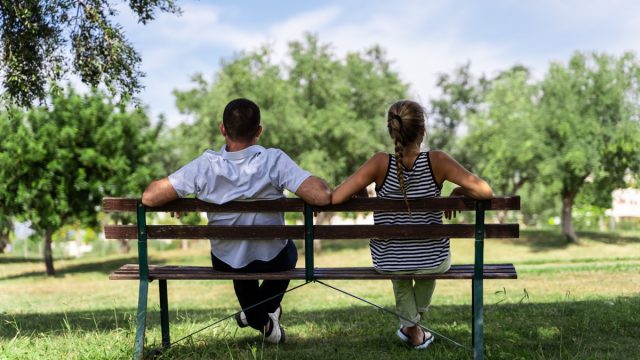The One Thing Your Date Is Lowering Their Standards on This Year

At the onset of the pandemic, it seemed certain that quarantine would shift the way people date. In the early months, a rush of people joined dating apps and began taking part in virtual dates in lieu of meeting at a bar and grabbing drinks. But it’s not just logistics that have changed—it’s also priorities. Data from Match’s Oct. 2020 annual survey found that many singles have new ideas about what’s important in a potential partner. Most significantly, the study found that almost half of daters said that physical attraction is less important to them now than it was pre-pandemic. Read on to find out what’s behind the shift, and if you need help on the apps, learn The One Word You Should Never Include in Your Online Dating Profile.
When seeking a partner for the end of the world, it makes sense that your priorities might evolve. According to the survey, about 45 percent of respondents said they are putting less emphasis on physical attraction than they were prior to the pandemic. Perhaps this is because more than half of participants (52 percent) said the pandemic prompted them to re-evaluate the things they had down as “musts” on their dating checklist. This led many users to be more open to different types of partners when scrolling through dating apps.
And more people than ever are looking for love, with 53 percent of respondents saying they got more serious about their search for a partner during the pandemic. That alone could have led many users to look past a person’s surface-level appearance to what’s inside. The Match study also found that a majority of singles moved toward more “meaningful dating” and engaged in more meaningful conversations before meeting in person.

Dating and relationship coach Colleen Grace Kelly says she’s seen a significant shift in what her clients were looking for in potential partners, noting that much of their preoccupation with physical attractiveness has lessened. Kelly thinks this could be a result of a few different things. “First, some of them are keeping their dates virtual at this point, or the ones that are meeting up in person are delaying certain levels of physical contact and intimacy, which makes sexual tension not as necessary or desirable as it once was,” she says.
Kelly also cites the fact that people’s loneliness has them yearning for connection. “They want someone they can talk to, laugh with, share the absurdities of these times with,” she adds. That results in many daters being less hung up on looks and more concerned with their connection to a person. According to Kelly, this shift could be hugely beneficial to daters who have, in the past, found themselves stuck in a cycle of bad matches.
“I am watching my clients actually shift out of some of their old patterns of falling for the wrong people (typically due to attractiveness), and broaden their viewpoint of what makes a compatible partner,” Kelly says.
RELATED: For more up-to-date information, sign up for our daily newsletter.
The shift in our daily lives and stress levels could also be contributing to the switch in single people’s attitudes toward dating. “When we experience periods of stress, upheaval, and transformation, we tend to shift our perspective on life, and our values deepen,” says relationship expert Cheryl Muir. “We place more emphasis on what we need, rather than what we desire.”
When the state of the world is in flux, Muir says companionship and connection tend to become more essential than physical appearance or social status. And if you’re wondering what kind of people are drawn to you, You’re Probably Most Attractive to This Type of Person, Study Says.